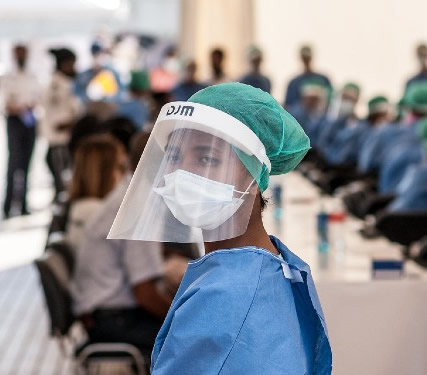SAMRC - a part of new global health research to reduce the impact of COVID-19
 Cape Town | The South African Medical Research Council (SAMRC) is part of a study that will measure the unanticipated opportunity costs of South Africa's COVID-19 response for children, mothers and people living with non-communicable diseases.
Cape Town | The South African Medical Research Council (SAMRC) is part of a study that will measure the unanticipated opportunity costs of South Africa's COVID-19 response for children, mothers and people living with non-communicable diseases.
Through two of its extramural research units (EMUs), the SAMRC Centre for Health Economics and Decision Science (PRICELESS SA) and the SAMRC/Wits Rural Public Health and Health Transitions Research Unit (Agincourt) alongside the Ezintsha Research Group and the Harvard School of Public Health, this research collaboration is part of a new global health research initiative funded by the National Institute for Health Research (NIHR) in partnership with UK Research and Innovation (UKRI), aimed at reducing the impacts of COVID-19.
Out of approximately 150 applications, the UK NHRI/UKRI partnership announced the awards to 12 new research projects specifically aimed at tackling the multiple health consequences of the pandemic in low- and middle-income countries (LMICs). With over nearly £7.6 million of funding, the projects (combined) will over the next 18 months focus on four priority COVID-19 research topics highlighted by the World Health Organization COVID-19 Global Research Roadmap: epidemiology; clinical management; infection prevention and control and health system responses.
Spanning more than 18 countries across Africa, South America and South East Asia, the new research will cover areas such as transmission and infection control, how people are affected by the disease in different settings and their long-term outcomes, including the risk of neurological problems. Other projects will focus on the indirect consequences of the pandemic including mental health, tuberculosis (TB) and provision of HIV care and other health services.
Health systems across the world have had to pivot suddenly and with great speed in order to address COVID-19. Although this may have been effective in containing the pandemic, it has not been without consequence to the burden of disease and the health services that existed pre-pandemic. Through a mixed-method, multidisciplinary study, the South African leg of the of the initiative will investigate how COVID-19 has impacted the supply and demand of routine health services, specifically those related to non-communicable diseases, as well as maternal and child health, in both urban and rural settings.
The project will quantitatively measure the impact of COVID-19 on routine preventive and curative health services, from supply and demand side perspectives, through a time series analysis of health service data. The researchers will also qualitatively evaluate the views of the community and healthcare workers on health service access and delivery. These results will enable policymakers to make evidence-based decisions regarding resource allocation that are also responsive to community needs and priorities.
According to Professor Karen Hofman, Director of the SAMRC unit based at PRICELESS SA, the team will focus its analyses on the critically important area of missed opportunities of health care access in South Africa – a country with majority of Covid cases on the continent. “This research will influence policy in future epidemic outbreaks, ensuring the best health care for all,” she said.
Hofman adds that while one critical aspect of this study is to measure the impact of redirecting resources from routine health services, it also aims to find out what the public and health workers think about this issue. This community research – based in the Agincourt site, will take place in rural Mpumalanga, while the urban community research will take place under the auspices of Ezintsha based in Hillbrow, Gauteng.
In other Covid- related research, PRICELESS has received funding from the Canadian International Development Research Centre (IDRC) to engage with vulnerable communities receiving and utilizing food parcels and donations, to inform policy and actions related food insecurity and the quality of food.
NOTE TO THE EDITOR:
Further reading on this:

